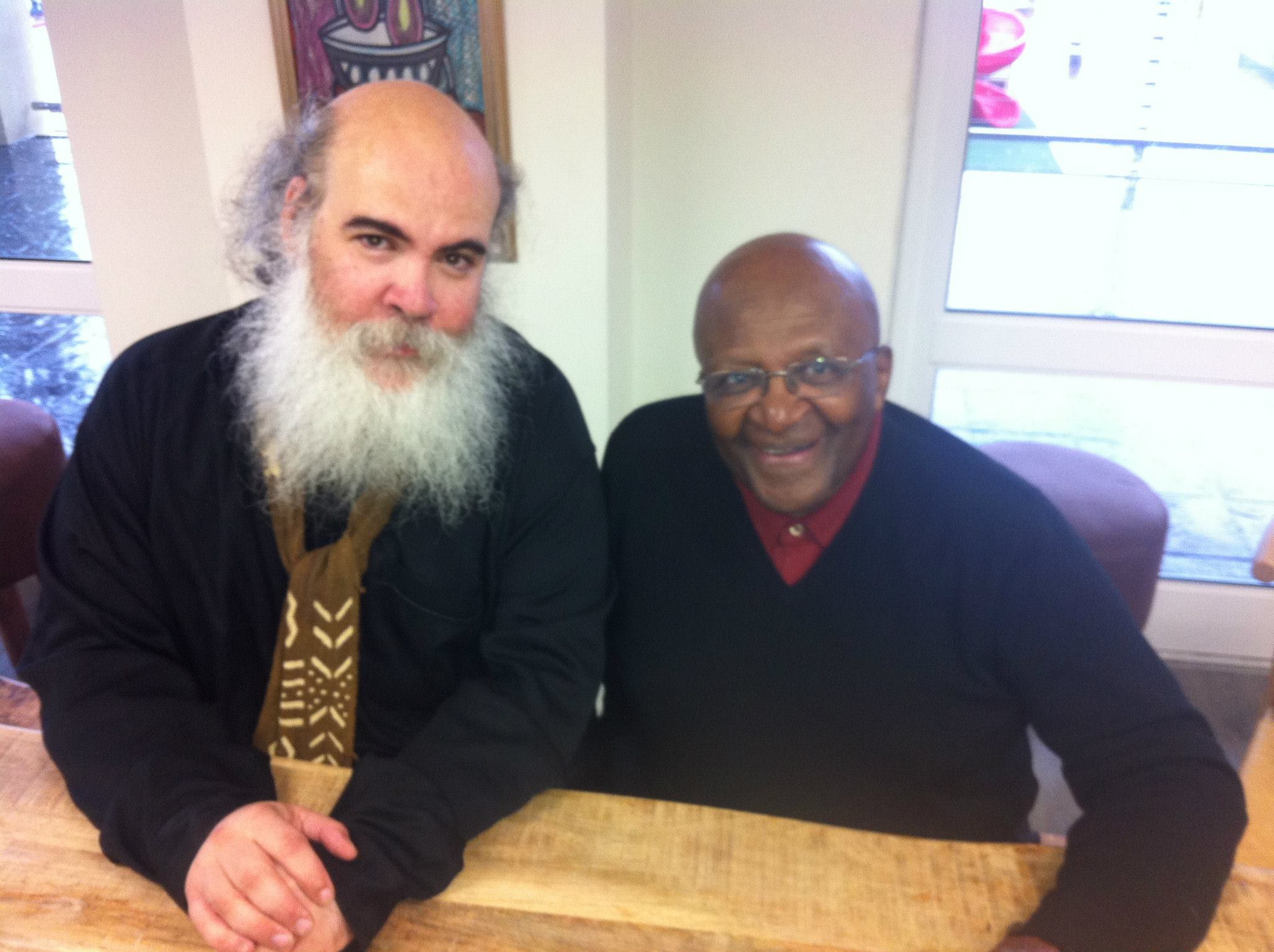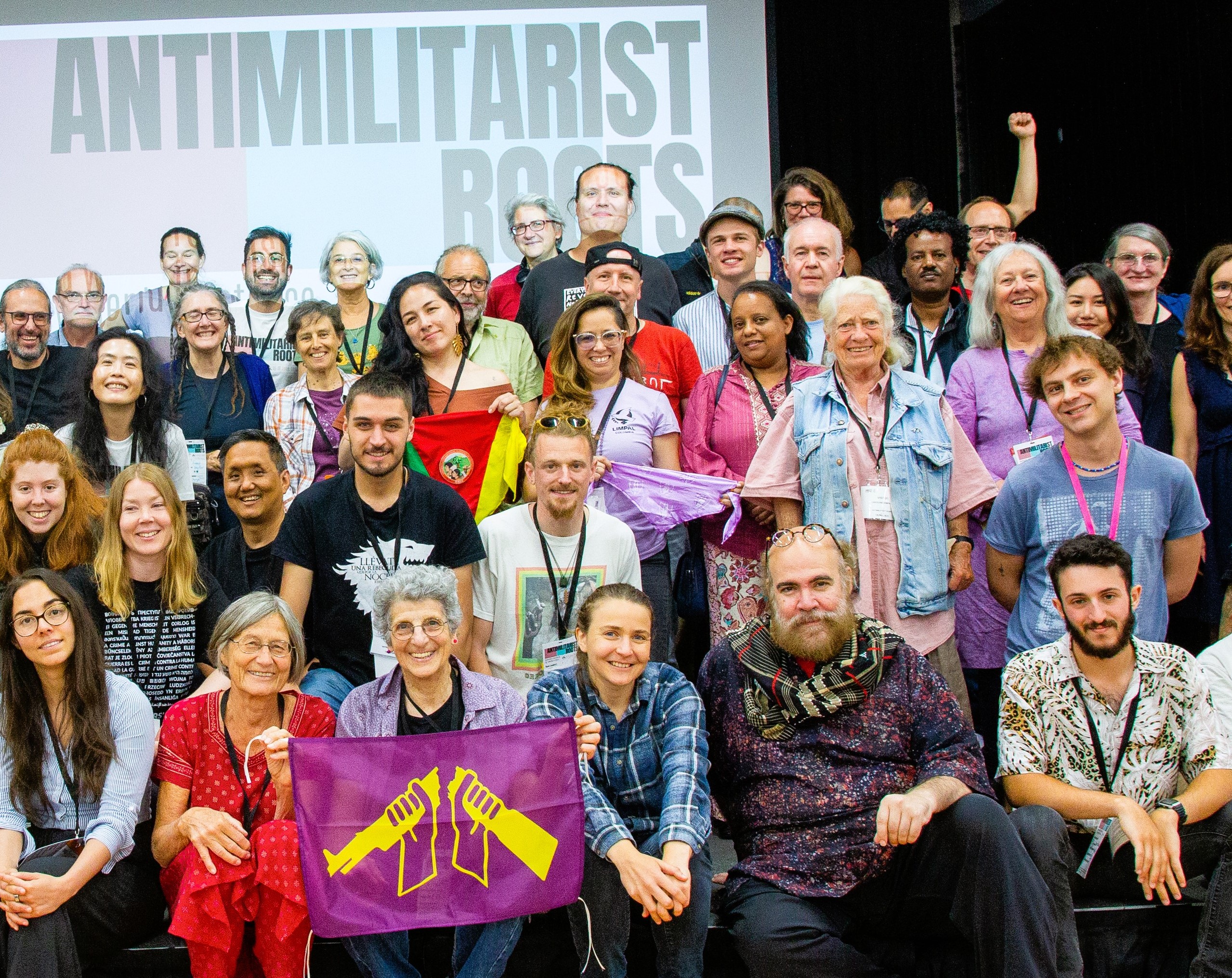Against all popular sentiments — against the powerful U.S. government and his own South African government — Desmond Mpilo Tutu (a man who would later also become a dear mentor and friend) spoke out in favor of international divestment from the racist Apartheid regime. He decried that the African masses of his country suffered much more under the white supremacist control of land and its people than any economic hardships that divestment might bring. Ten years later, Bishop Tutu was awarded the Nobel Peace Prize. Ten years after that, much to the surprise of many, the political aspects of South African Apartheid were swept away with significantly less bloodshed and death than was popularly predicted.
When then-Archbishop Tutu and I got to spend some time together another 20 years later, in 2014, it was just a few days after Israel’s longest and most intense military operation in Gaza so far, launching what the Wall Street Journal describes as “a 50-day operation against Palestinian militants.” The Archbishop whispered to me, then repeated publicly many times: “God must be weeping.” It was clear to this preeminent anti-Apartheid leader that Israeli policy in Palestine was another version of modern-day Apartheid.
Today, in early October 2023, South African Anglican Archbishop Thabo Makgoba reasserted a position affirmed last month by the ruling body of the South African high church. “We are not opposed to the Jewish people but to the policies of Israeli governments, which are becoming ever more extreme. South Africans must acknowledge that Israeli’s policies towards Palestinians are a carbon copy of the Apartheid-era policies of South Africa or risk in becoming complicit in the subjugation of Palestinians.”

Echoing the words and work of his Nobel prize-winning predecessor, Makgoba noted that “the parallels are impossible to ignore.” It is time for the whole world and all those concerned with basic human rights, democracy and freedom to stand up for Palestinian liberation and an end to the violence and war.
The events in Palestine and Israel this October have already produced more written commentary than probably is useful — from every political, social, spiritual and strategic point of view. One illuminating piece published in a contemporary Israeli mainstream periodical underscored an important fact of this historic moment: that within Israel there is now a growing understanding that Palestinian rights and freedom are indispensable to any possible future and that resistance on the part of Palestinian people is not only fully understandable but also rational. This doesn’t mean, of course, that everyone agrees on any given tactic or action or partisan perspective.
It would be tragic, however, if, in all the analysis about the war (which of course has been going on for many decades), those of us outside of the region fail to grasp that the current Israeli government has been at its very lowest ebb, with extraordinary internal turmoil and dissension. Resistance to military service among young Israelis has recently been at an all-time high, with hundreds of high schoolers jointly proclaiming over just the past two months that they’ll refuse to fight in the Israeli Defense Force. Understanding dissent and resistance within the Zionist state should help us determine what effective and strategic solidarity might look like.
Another Israeli voice, that of the former Israeli Defense Force soldiers and resisters who make up the group Breaking the Silence, is worth noting. “Our Jewish separatist government brought us to this point,” they wrote. “Israel’s security policy, for decades now, has been to ‘manage the conflict.’ Successive Israeli governments insist on round after round of violence as if any of it will make a difference. They talk about ‘security,’ ‘deterrence, changing the equation.’ All of these are code words for bombing the Gaza Strip to a pulp, always justified as targeting terrorists, yet always with heavy civilian casualties. In between these rounds of violence we make life impossible for Gazans, and then act surprised when it all boils over.”

At the War Resisters’ International gathering in London last July — commemorating 100 years of that organization’s support for resisters from Israel, South Africa, Eritrea, Russia as well as Ukraine and every place on the planet where people have and continue to fight for the right to refuse to kill others — we heard from long-time Israeli resister Sahar Vardi and more recent refusenik Evyatar Moshe Rubin. Their stories corroborated the sentiments of a growing number of Israelis, who question the highly militarized, paranoid and divided state.
“The question Israelis are all asking is — where were the soldiers yesterday? Why was the Israeli Defense Force seemingly absent while hundreds of Israelis were slaughtered in their homes and on the streets? The unfortunate truth is that they were ‘preoccupied.’ In the West Bank,” Breaking the Silence revealed this week. “Our country decided — decades ago — that it’s willing to forfeit the security of its citizens in our towns and cities, in favor of maintaining control over an occupied civilian population of millions, all for the sake of a settler-messianic agenda.”
In this context, it is at the very least absurd and ridiculous for some “leftists” to suggest again that “nonviolence clearly does not work.” For those intent on short-sighted and unstrategic views of social change that are a half-century throwback, it might easily be suggested that this last week equally proves, in irrefutable terms, that violence has also been proven to “not work.”
What then might we do in a situation and a long-lasting war where nothing seems to work?
Here, the work and recent words of a wise Palestinian friend, Professor Mohammed Abu-Nimer, provide some basic answers.
In summary, Abu-Nimer insists that as a whole we must:
- Negotiate peace that grant Palestinians their genuine independence;
- End the apartheid in the occupied territories;
- Free Gazans from their open prison; and
- Allow both Israelis and Palestinians to live dignified lives.
Recently named inaugural Abdul Aziz Said Chair in International Peace and Conflict Resolution at American University’s School of International Service, Abu-Nimer explains in his essay Enough is Enough that the collective “we” of Middle East stakeholders have failed to learn the historical basis of what will achieve justice and lasting peace. Israel’s fundamental “wrong lesson” is that greater Palestinian death and devastation will equate to greater security for the Zionist state. The “wrong lesson” in the thinking of some Palestinians is that proving weakness and vulnerability in Israel’s massive security system and frightening Israel’s citizenry will lead to an ultimate acceptance of the need for an end to the occupation and settler colonialism.
The ultimate logic of both poles requires the total annihilation of the “other” to even begin to “succeed.” Abu-Nimer demands that the people of the region ask where they are going with these perspectives and endless war. “Since every round in the past hundred years,” he writes, “the level and degree of violence has increased.”
One aspect of increased violence — the targeting (and subsequent kidnapping or murder) of civilians — is a particularly heinous violation of international law and multiple, multi-faith religious doctrines. Palestinian civil society organization Addameer, however, has emphasized that multiple violations of both local and international human rights practice have increased in this period, as Israeli Special Forces have penalized women prisoners and political prisoners by cutting them off from their lawyers, family members and in some cases all communication.
The Third Geneva Convention and other United Nations protocols continue to be ignored as the intensifying occupation and systemic genocidal actions constitute, in the words of legal school and Addameer Director Sahar Francis, “a crime against humanity.”
Like the South African example before us, we must realize both that there is more than one means to successfully struggle for justice and that partial justice reforms will not be enough to ensure lasting peace.
Let us do much more than write statements, spout rhetoric, and/or line up to be in one small camp or another. Solidarity will inevitably be expressed in different ways by those who have differing views on resistance. Combatting Apartheid in South Africa meant building coalitions across ideological, tactical, religious, political, economic and geographic lines. For success in the struggle against Israeli Apartheid, we will require no less.
Let us do the actual international work to build a mass movement that will end the occupation and settler colonialism for good and forever! Ameen, Amen, Salaam and Shalom!
Thanks, Matt. A question: how would you recommend people go about nonviolent action if the world does not sympathize with the cause at all? One commentator pointed out in the Great March of Return, that snipers were sent to shoot protestors and the international community didn’t seem to rally behind the cause any more. Would be interested in your comments.
Millions of people believe Israel has no right to exist. It is all stolen Arab land. Millions of other people believe the Jewish people deserve a homeland. There is such thing as a Palestinian people or that Jordan is Palestine and most of those who left in 1948 left voluntarily. Unless and until people move off those positions I am very pessimistic about the future hope of peaceful coexistence.